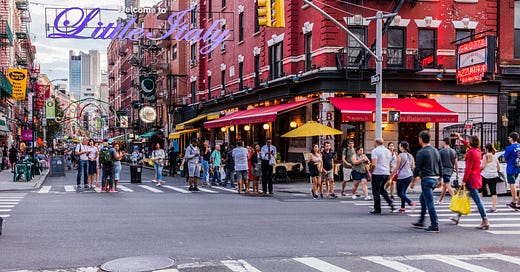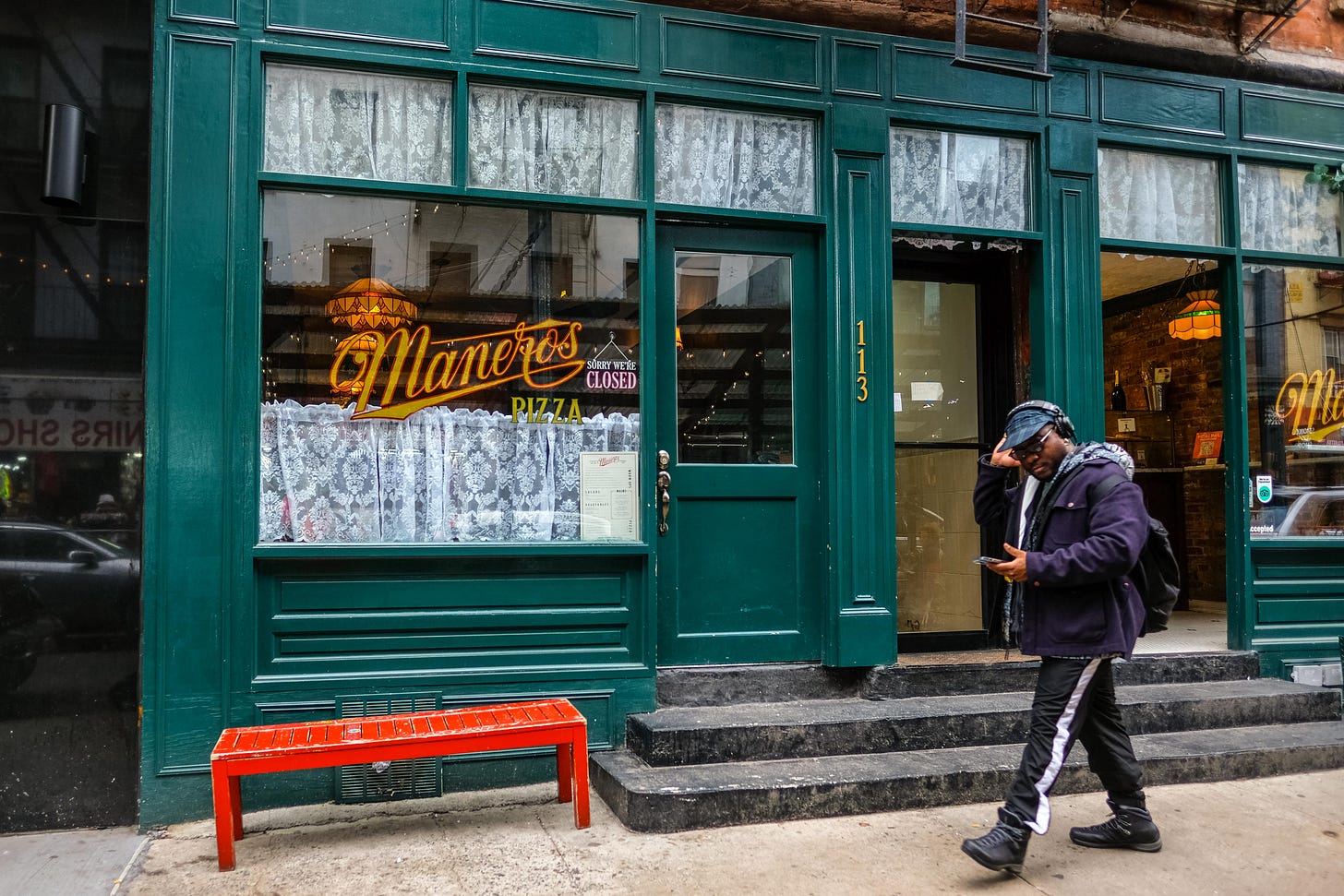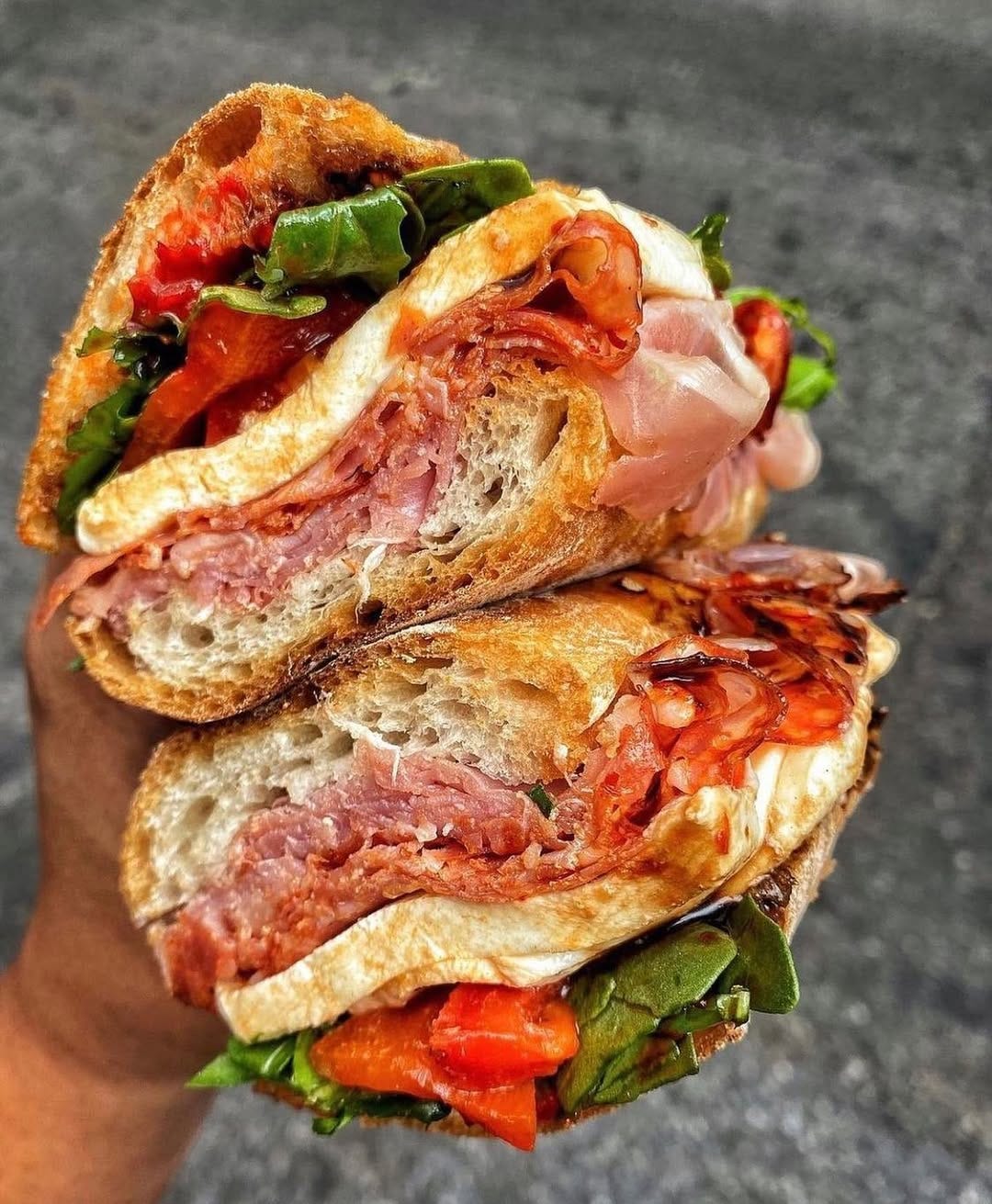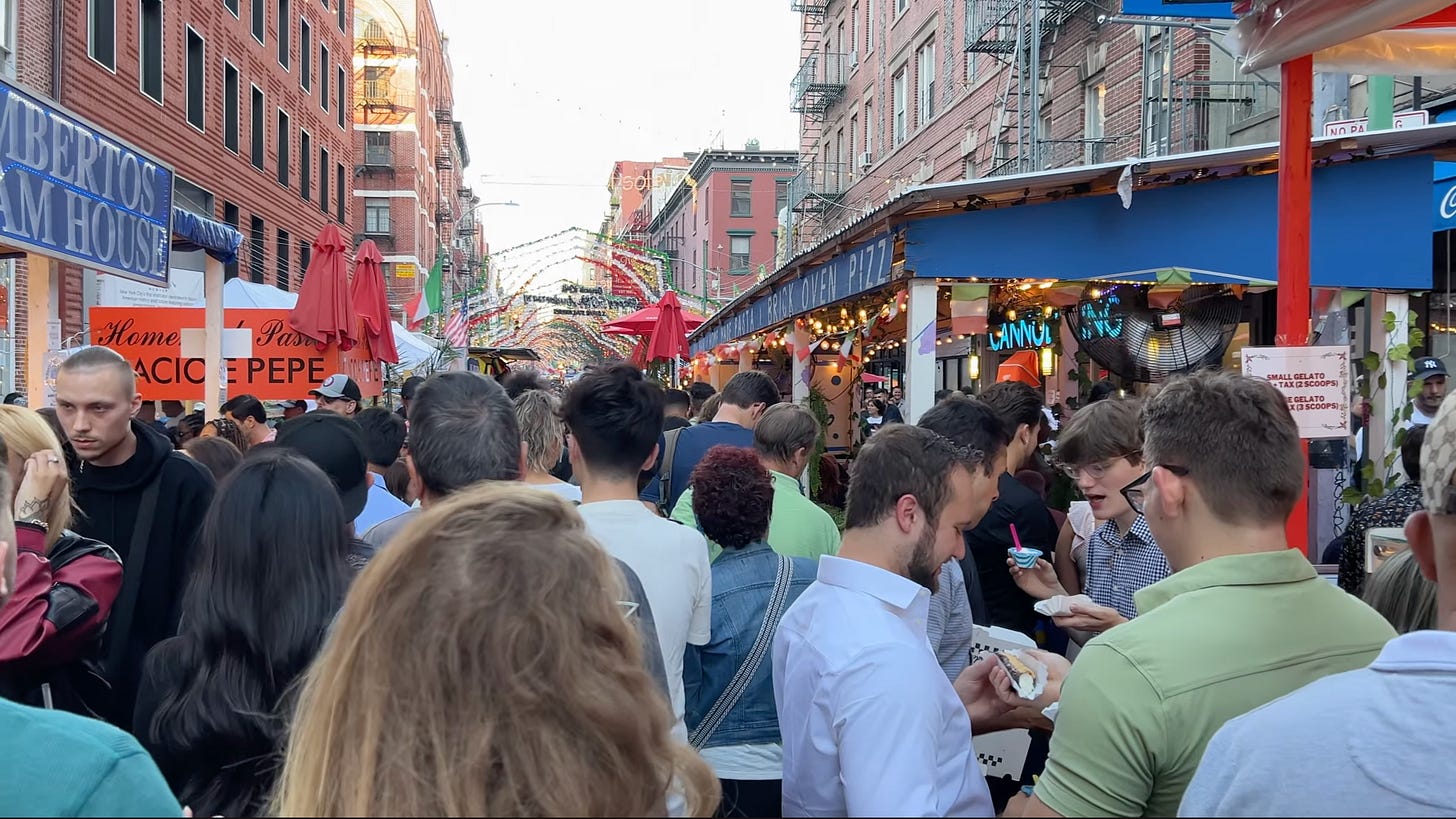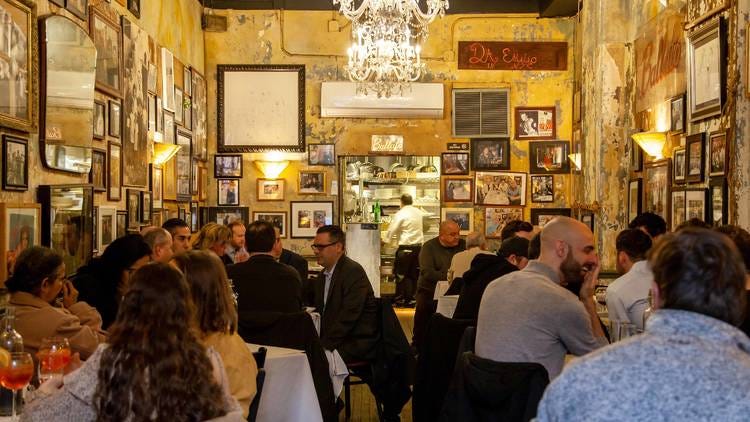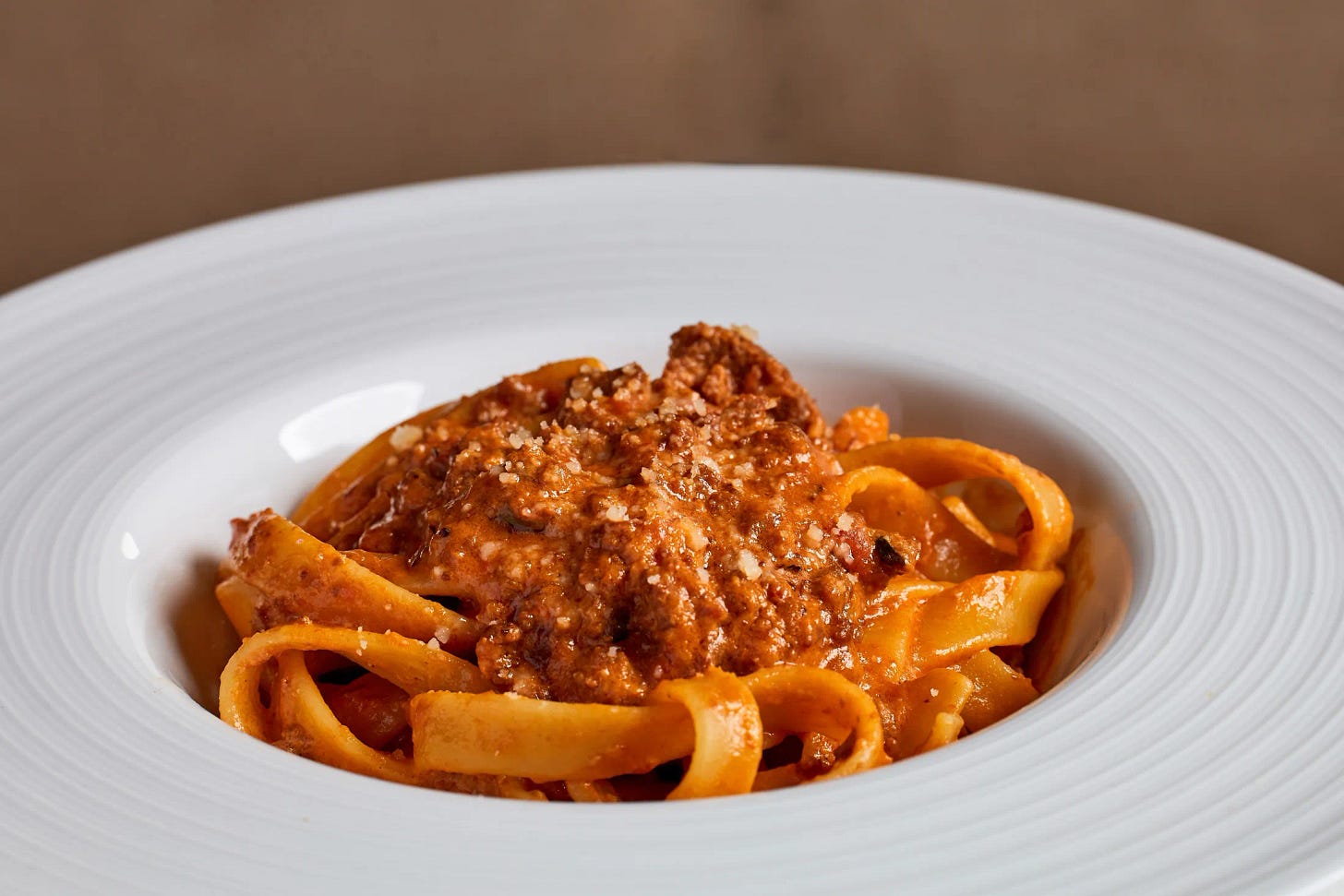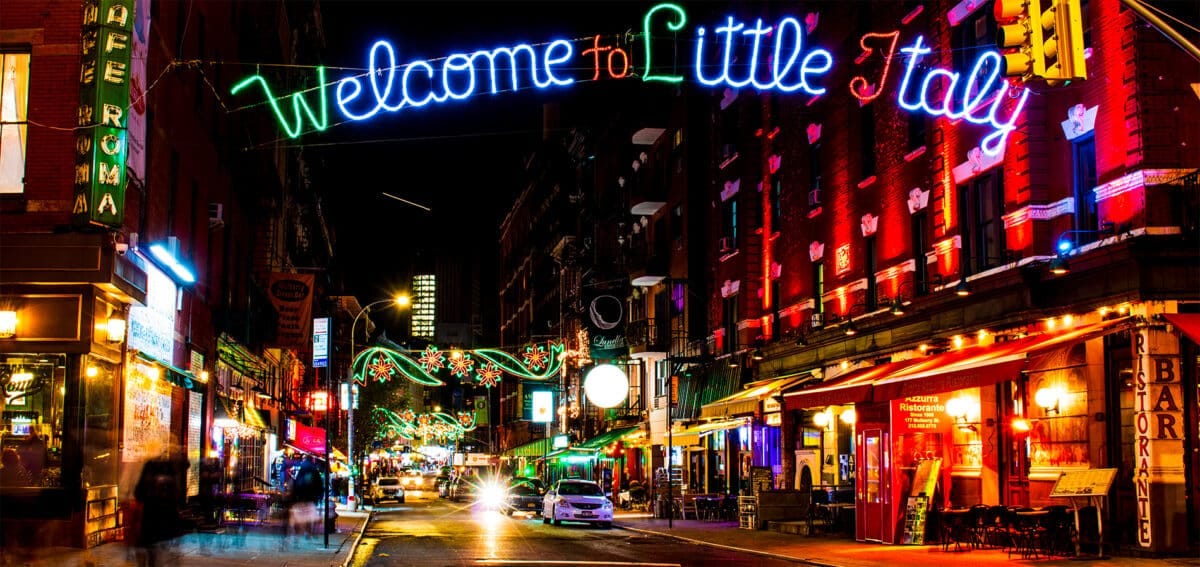Mulberry Street: A Love Letter to New York’s Little Italy
Walk slow. Eat well. Stop and talk to the chefs behind the counter making your meal. Drink a bottle of Amarone with someone. Here, there’s a table set, a plate of food, and someone to share it with.
Mulberry Street
There are some days when New York City just seems to forgive you for pretty much anything and everything. Those are the days that the city’s usual snarl of horns and the impatient huff of the crosswalk crowd seems to soften, just a little. The afternoon sun even slants down Mulberry Street with an easy generosity of an old friend buying you a round or two. It’s that certain time of year when the city just feels like it’s on the cusp of something truly grand. In early summer, the city’s grime hides and softens beneath a coat of tourists and sunshine, and every block is a stage for the human theater to be on full display. Today was one of those days. New York City’s own Little Italy, that ever-shrinking but never-vanishing sliver of the old world, today was humming with something close to magic.
Mulberry Street was a historical, living, breathing postcard from a slice of New York that refused to bend, no matter how many banks and boutiques tried to muscle their way in. No matter how many “outside” stores and restaurants tried to push in from other neighborhoods. For a long time, this was the original Italian enclave—before Manhattan rents and waves of changes nipped and gnawed at its edges until only a few blocks remained of this portion of Italian history and heritage. Walking here was a privilege and still the ultimate experience on any visit to the city. Here, the air was always tinged with the scent of garlic and frying peppers. I could always hear the loud voices echoing from inside a sandwich shop or a restaurant, always loud and affectionate. The ghosts of the Italian immigrants that built this amazing community always seemed to walk next to me, gently whispering old family recipes that have been long forgotten.
Today, I was not in not in a hurry. I was, in fact the flâneur. The meanderer. The happy wanderer. The guy with nowhere particular to be except right here, right now. I was not in a rush. The city, however, was always in a rush. But not in Little Italy. Here, you strolled. You lingered. You let the ghosts of a thousand Sunday dinners guide you. I breathed in the city. Everything. All of its aromas, both the good and the bad, and let it wash over me. The laughter echoing from the sidewalk tables that were scattered along the street. The clink of glasses and cutlery on plates as people ate, drank and enjoyed their lunches. The languid curls of smoke from cigarettes held at the perfect, the just-so Italian angle—fork in one hand, utensil in the other. The air was thick with all of it. The humidity. The scent of garlic, basil, and frying dough. It was a smell that clung to your clothes, your hair, and your very soul. This was Little Italy, for just a few blocks. It’s still defiantly itself-old men on folding chairs watching the pedestrian traffic and chatting in Italian. Families lunching over plates of linguine. Tourists gawking at red-checked tablecloths and neon signs that have been flickering since Sinatra was a kid.
Regina’s Grocery
I shuffled into Regina’s Grocery, a place that felt like a family’s living room masquerading as a sandwich shop. Soprano’s references aside, the place was as authentic New York Italian as it could possibly get. The counter was manned by a couple of guys who look like they could have been cast in any Scorsese film of the last thirty years. Even still, they were as warm as a basket of fresh bread. Look, if you know, you know. This place was not just a sandwich shop. It was a temple to the Italian-American dream. It was a place where the past and present collided between two slices of semolina bread all pressed together with the love of a Nonna who has seen some serious shit. The guys behind the counter were laughing, and giving everybody just enough grief for taking our sweet time with the menu. Honestly, that was part of the charm. “Hey, paisan, you gonna order or just stand there looking hungry?” one of them called out, grinning.
Just to show them that I meant business, I ordered an Uncle Jimmy—a sandwich that was an edible memory and portable time machine. Soppressata, capicola, provolone, spicy peppers, and a generous swipe of ‘that secret sauce’ tucked between slices of semolina bread that crunched just right when you bit into it. It’s the kind of sandwich that made you want to call your mother, just to tell her you love her. Even if you weren’t really Italian. The kind of sandwich that you eat with both hands, standing up, because you don’t want to lose a single drop of juice to the sidewalk. While the assembly line went to work crafting my edible work of art, I chatted with the guys behind the counter. They were busy, but they always had enough time to shoot the shit and bust some balls. The conversation was the condiment, the secret ingredient behind all of the fixings. We talk about how the neighborhood was always changing and yet, somehow, always managed to stay the same.
The older chefs reminisced about the old days. About how the neighborhood used to be wall-to-wall Italians every where you turned. You couldn’t walk two steps without hearing someone arguing in rapid-fire Italian. English, get real, no one spoke English on these streets. They remembered how everyone knew your name and your business the moment you wandering in through the front door. Of course, all of the Nonne would gossip throughout the neighborhood, and everyone knew everyone’s business. Actually, all the Nonne knew everything, they were the glue that held this entire neighborhood together. They were the network of secrets, that they generally made public between themselves. There was pride here, and a little bit of sadness, too. But mostly, there was love. Love for the food. Love for the people. And definitely love for the neighborhood that held it all together.
And just like that, my sandwich was ready to go. “People come for the food, but they stay for the feeling,” the manager said to me, passing me my sandwich, expertly wrapped in butcher paper. “It’s like coming home, even when you’re not from here.” I took my sandwich to go, thanking all of the wise guys behind the counter profusely. I walked down the street slowly, carrying this wrapped golden goose, letting the flavors and aromas explode in my mouth and nose with every step and every slow bite. The bread was seductively chewy. The meat was spicy and rich. The mozzarella was the perfect balance of cool and creamy, even on this scorcher of a day. It was a sandwich that tasted like I was sitting at my friend’s Italian grandmother’s kitchen table again. Watching her feed us lunch as she cut up her bread and layered it with the ingredients that would forever embed themselves in our memories and ruin us for any other sandwich for the rest of our natural lives.
The Heartbeat of the Street
As I was visiting New York City on business this week, I had a few errands that needed my attention. And while I had to pull myself away from Little Italy, I inevitably wound myself back towards this classic area of the city once again for dinner. Coming back here in the evening, was like stepping into a magical wonderland. The streets nearly hummed under my every step. The sidewalks seem crowded, more crowded than it was during the scorching part of the midday. The tourists had mostly all departed, and the locals had filled the city blocks, spilling out of bars and restaurants with their evening white wines and aperitifs. The evening light managed to turn the city street golden in rays of sunshine that danced off of century-old windows and doors.
The outdoor dining spaces were once again filled to the brim, but even more so than earlier in the day. Chairs scraped against pavement as patrons shifted in their seats. Wine bottles popping open one after another and echoed off of the old stone walls of the buildings like some vinicultural symphony with its own rhythm. There was a kind of choreography to it all. It was a dance of waiters and diners and the ever-present vibration of conversation and laughter. More so now than earlier in the day, the scent of grilled sausage wafted through the air. It mingled with the sharp tang of sage and espresso. There was also the sweet perfume of summer flowers from a nearby bodega that bloomed and seemed to literally spill onto the sidewalk. Mulberry Street called me back. It yanked me back here for dinner with a magnetic pull I couldn’t quite resist. And in all honesty, really didn’t want to.
Dinner at Emilio’s Ballato
I stepped between side walk and street as the sun dipped below the horizon, the city shifting itself into evening mode. The crowds didn’t thin, instead, the street seemed to be packed even more with patrons and locals all out and about for an evening drink. Street lights flickered to life all around me, and the air cooled providing a welcoming feeling of relief from the mid-day heat wave. Tonight I had a dinner date. It was more of an invitation to dine, but it was one that I absolutely had no intention of turning down. I headed to Emilio’s Ballato restaurant with anticipation and excitement. It was an old-school temple of red sauce and hospitality. It was a place where the past and present sat down to dinner together every night, broke bread, and balanced out the family responsibilities.
I stepped inside Emilio's Ballato and was greeted at the front door by Anthony Vitolo, the chef and executive owner. Tonight, he was my host and friend. Anthony had that rare mix of old-school charm and modern swagger that made him seem like a guy who knew his way around a kitchen all too well. He led me to a corner table, where we settled in, a bottle of 2017 Giuseppe Quintarelli Amarone della Valpolicella Classico already breathing between us, aerating to perfection. As he poured the wine for both of us, I had a second to look around his restaurant. The walls were lined with photos of celebrities, politicians, and regulars. The tables were packed from one wall to another. If you were looking to dine in a quiet and private establishment, this is not the place. Instead, this was the place for communion. From where we were sitting, I could clearly see the kitchen, where the action always was on full display.
Anthony knew exactly what I liked and took the liberty of pre-ordering a plate of Tagliatelle Alla Bolognese. Because when in Rome, or at least in Little Italy, you always ate like family. We dug in with our forks, the plate of food steaming and hot in front of us. The pasta was of-course, perfect. The sauce was rich and deep. It was the kind of dish that felt like a hug from someone you’ve missed for way too long, or perhaps a love affair with a mistress that you haven’t seen in decades. Between bites, I asked Anthony about the business. About the delicate art of juggling family and work. Flying between New York and Fort Lauderdale. And finally, striking the perfect balance between tradition and innovation.
“It’s all about balance,” he remarked between swirls of pasta and sips of wine. “Family comes first—always. That’s the way my dad did it, the way my grandfather did it. You work hard, you take care of the people you love, and you make sure everyone at your table feels like they’re family, too.” Anthony spoke about his journey. He reminisced between sips of wine how he grew up in the kitchen, learning from his father, the legendary Emilio Vitolo himself. “The kitchen was my playground. I’d watch my dad make Sunday sauce, the whole house filled with the smell of tomatoes and basil. That’s where I learned what food could be—not just something you ate, but something that brought people together.”
I took a long swirling sip of my wine, thoroughly enjoying this incredible Amarone and ask Anthony about his favorite childhood dishes. “What were the ones that shaped you as a chef?” I asked. Anthony sat back in his chair and laughed for a moment. “It’s funny,” he said, stuffing a fork full of pasta in his mouth. “The simplest things are the ones that stick with you. My mom’s pasta e fagioli, my dad’s chicken parm. Food that’s honest, unpretentious. That’s the heart of what we do at Ballato—no tricks, no gimmicks. Just real food, made with love.” True to his words, Anthony told me about his new spot in Fort Lauderdale. It was a sun-drenched outpost of the Ballato philosophy. “It’s a different vibe there, sure, but it’s the same heart. My brother and I run it together—it’s family working with family. It’s not always easy. It’s not supposed to be. But at the end of the day, we’re sitting around the same table. That’s what matters. We argue, we laugh, but when the doors open and the customers come in, we’re in it together. That’s the magic. That’s what my dad taught us.”
Like every Italian, Anthony’s hands moved as he spoke, shaping the air as if coaxing a sauce to the perfect consistency in front of him. His eyes were sharp but warm. And even as we spoke, he continued to scan the room. He saw everything. From a regular needing a refill, a newcomer looking lost, a server hesitating by the kitchen door. In the end, it was all about creating an air of home in this space. To make people feel like they were dining in his own house. “Hospitality, to me, is about making people feel seen,” he said, pouring a splash more Amarone into both of our glasses. “Look, anyone can put food on a plate. But to make someone feel like you’ve been waiting for them all day? That’s the secret. That’s what we try to do at Ballato. But that didn't stop here in New York City, now, we do that in Florida, too.”
We finished our pasta and sat back in our chairs, the wine glasses swirling in front of us. The Amarone breathed, dark and mysterious, filling the space between us with notes of cherry, leather, and something almost smoky. We briefly spoke about the wine. How it was a celebration in a bottle. How it was meant for long meals, good company, stories told with hands waving and voices rising, bouncing around the table. And most of all, how it paired with food, how it paired with laughter, and how it paired and brought everyone at the table together.
I ask Anthony about the challenges of working with family. An experience that in many cases could be a double edged sword. And while there may be plenty of joys, there were also unavoidable headaches as well, as well as potential endless negotiations. He leaned back, smiled, and stared pointedly at me, as if the question itself was a familiar old friend. “It’s not easy,” he admitted. “But nothing good ever is, right?! My brother and I, we’re different in a lot of ways. I’m more old-school, he’s got new ideas. But we respect each other. We know we’re working toward the same goal: making people happy, keeping the family legacy alive.”
Anthony described the new Florida restaurant as a “love letter to his father,” a way of bringing the Ballato name to a new place, a new crowd, while never forgetting where they came from. “The sunshine, the people, the way everyone came together over a bowl of pasta. That was universal. It was the same here as it was down there. Doesn’t matter if you’re in New York or Fort Lauderdale—good food, good company, that’s what it was all about.” I ask Anthony if he ever got tired, if the weight of tradition ever felt too heavy. And if the travel, the back and forth between New York and Florida, working the entire week, ever got old for him. He shook his head before I even finished the question. “Sure, it’s exhausting sometimes. But when I see people coming back, bringing their kids, their grandkids, telling stories about coming here with their parents? That’s everything. That’s why we do it. Tradition isn’t a burden—it’s a gift.”
As with all things and even incredible dinners, eventually, even the best things must come to their inevitable end. The plates were cleared. The wine glasses were emptied. The room glowed with the soft, satisfied buzz of a meal well enjoyed. Anthony stood, shook my hand, and clapped me on the shoulder in the old Italian way—firm, affectionate, and familial. “Come back soon,” he said. “Next time, we’ll do the veal. And next time, bring the whole family.” I thanked him for his incredible hospitality, kindness, and generosity, and headed for the front door. I step out into the New York night, the air buzzing with possibility, even at this late hour. After all, this was the city that never slept. The city felt different every time I came here. Only this time, it felt softer somehow. It felt more homey rather than large and looming. I walk slowly, letting the meal settle in my gut, and as I always did, I let the night wrap itself around me. Mulberry Street was quieter now. The crowds had thinned. The tables had emptied. The shop windows glowed soft and gold, and darkness covered the inside of each bodega. The city’s heartbeat was slowing, but never quite stopped.
I pass Regina’s Grocery again. The chefs inside were cleaning up after a long and busy day. They were all laughing and poking fun at one another. It was expected and very typical behavior in the late evening before closing, before running out to grab a drink of their own. I took a moment to think about Anthony and about his family. I thought about the generations of cooks, servers and hosts who have kept this neighborhood alive and going. Food was truly a magical thing. Food connected all of us no matter what culture we were from. Food carried us across time and distance, and always reminded us who we were and where we came from. Little Italy might have been smaller than it once was, hemmed in on all sides by the “new” New York. But walk down Mulberry Street on a summer night, and you will still see. It wasn’t hidden. It was in your face, just like this entire city was. The heart was still beating, the tables were still full, and the stories were still being told. And if you’re lucky, if you walked slow enough and kept your eyes open, you might just have found yourself at home.
In the end, that’s what New York really was. It’s what Little Italy was. It was a place where the past and present met over a plate of pasta. Where strangers became family instantly while sitting at a table together. Where every meal was a memory ready to be made. It was a city that demanded everything and gave you back just enough, if you knew exactly where to look. So walk slow. Eat well. Stop and talk to the chefs behind the counter making your meal. Order the Uncle Jimmy at Regina’s Grocery. Share a bottle of aged Amarone with someone you know or perhaps a stranger who was about to become a friend. And remember: in this city, in this neighborhood, you’re never really alone—not as long as there’s a table set, a plate of food, and someone to share it with.

